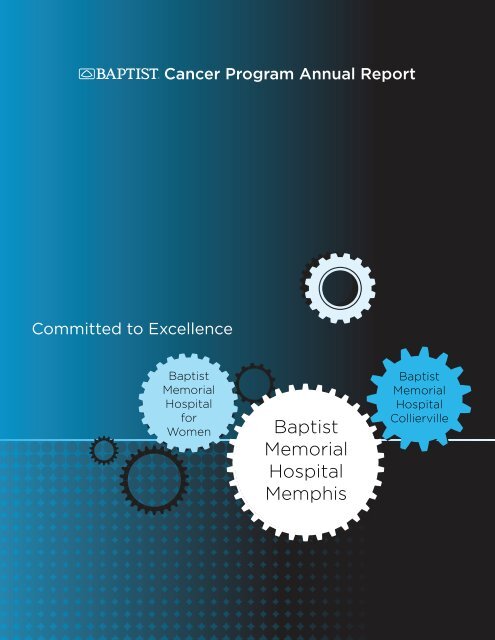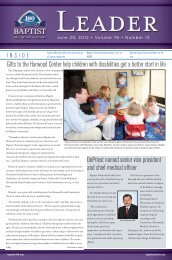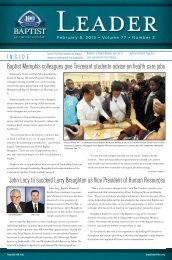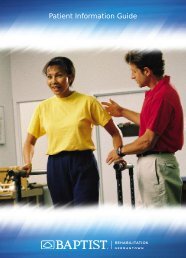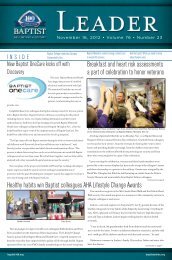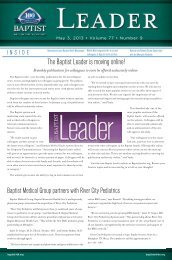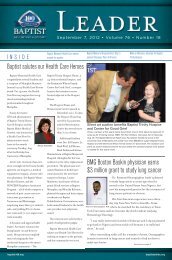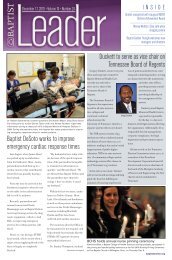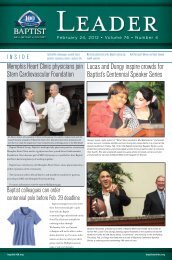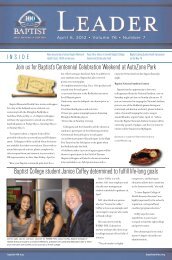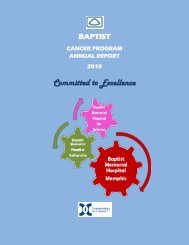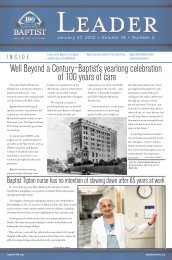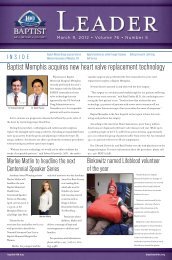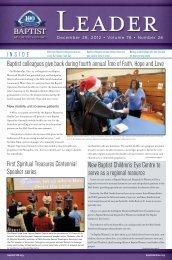Baptist Cancer Program - Baptist Memorial Health Care
Baptist Cancer Program - Baptist Memorial Health Care
Baptist Cancer Program - Baptist Memorial Health Care
Create successful ePaper yourself
Turn your PDF publications into a flip-book with our unique Google optimized e-Paper software.
<strong>Cancer</strong> <strong>Program</strong> Annual Report<br />
Committed to Excellence<br />
<strong>Baptist</strong><br />
<strong>Memorial</strong><br />
Hospital<br />
for<br />
Women<br />
<strong>Baptist</strong><br />
<strong>Memorial</strong><br />
Hospital<br />
Memphis<br />
<strong>Baptist</strong><br />
<strong>Memorial</strong><br />
Hospital<br />
Collierville
Table of Contents<br />
<strong>Baptist</strong> <strong>Memorial</strong> <strong>Health</strong>care Corporation 2<br />
<strong>Baptist</strong> <strong>Memorial</strong> <strong>Health</strong>care Foundation 3<br />
<strong>Baptist</strong> <strong>Memorial</strong> Hospital—Memphis 4<br />
<strong>Baptist</strong> <strong>Memorial</strong> Hospital for Women 5<br />
<strong>Baptist</strong> <strong>Memorial</strong> Hospital—Collierville 6<br />
<strong>Baptist</strong> <strong>Cancer</strong> <strong>Program</strong> <strong>Cancer</strong> Committee 7<br />
<strong>Baptist</strong> <strong>Cancer</strong> Management Conference <strong>Program</strong> 8<br />
<strong>Baptist</strong> Oncology Nursing 9<br />
<strong>Baptist</strong> Women’s Center Comprehensive Breast Center 12<br />
<strong>Baptist</strong> <strong>Cancer</strong> Prevention & Early Detection 14<br />
<strong>Baptist</strong> In the Community 15<br />
<strong>Baptist</strong> Radiation Oncology 16<br />
<strong>Baptist</strong> Clinical Research Center 17<br />
<strong>Baptist</strong> Medical Nutritional Therapy 18<br />
<strong>Baptist</strong> Rehabilitation Services 19<br />
<strong>Baptist</strong> Genetic Counseling Services 20<br />
<strong>Baptist</strong> Trinity Hospice 21<br />
<strong>Baptist</strong> Tumor Registry 22<br />
2010 <strong>Baptist</strong> <strong>Cancer</strong> Statistics 23<br />
Brain Tumors: A Look at Tumor Registry Data 28<br />
<strong>Baptist</strong> Phone Numbers 35<br />
Page1
<strong>Baptist</strong> <strong>Memorial</strong> <strong>Health</strong>care Corporation<br />
Regarded as one of the premier health care systems in the nation, <strong>Baptist</strong> <strong>Memorial</strong> <strong>Health</strong> <strong>Care</strong> is an awardwinning<br />
network dedicated to providing compassionate, high-quality care for patients. With 14 affiliate<br />
hospital through the Mid-South, <strong>Baptist</strong> combines convenience with excellence of care—two reasons we have<br />
been named among the top health care systems in the country for several years.<br />
With the intention of caring for people close to their homes, the <strong>Baptist</strong> system also offers more than 3,100<br />
affiliated physicians; home, hospice and psychiatric care; minor medical clinics; a network of surgery,<br />
rehabilitation and other outpatient centers; and an education system highlighted by the <strong>Baptist</strong> College of<br />
<strong>Health</strong> Sciences.<br />
Since our modest beginning in 1912 with a 150-bed hospital, <strong>Baptist</strong> has grown to meet the expanding needs<br />
of the communities we serve, at one point becoming the largest privately owned hospital in the nation. But<br />
what has remained is the same caring atmosphere that inspired our founders. From our kitchen staff and<br />
office personnel to our experienced medical staff and renowned clinical services, that pervasive spirit of<br />
caring inspires every area of operation at <strong>Baptist</strong>.<br />
Mission<br />
In keeping with the three-fold ministry of Christ - Healing, Preaching and Teaching - BMHCC is committed to<br />
providing quality health care.<br />
Vision<br />
We will be the provider of choice by transforming the delivery of health care through partnering with patients,<br />
families, physicians, care providers, employers and payers; and by offering safe, integrated, patient-focused,<br />
high quality, innovative cost-effective care.<br />
Values<br />
Compassionate <strong>Care</strong> and Service<br />
Teamwork and Trust<br />
Innovation and Excellence<br />
Respect for the Individual and the Value of Diversity<br />
Page2
<strong>Baptist</strong> <strong>Memorial</strong> <strong>Health</strong>care Foundation<br />
Enhancing the Quality of <strong>Cancer</strong> <strong>Care</strong> in the Mid-South<br />
Established in 1983, the <strong>Baptist</strong> <strong>Memorial</strong> <strong>Health</strong> <strong>Care</strong> Foundation is the fundraising arm of <strong>Baptist</strong> <strong>Memorial</strong><br />
<strong>Health</strong> <strong>Care</strong>--a not-for-profit organization. Funds raised by the Foundation help to accomplish <strong>Baptist</strong>'s<br />
charitable care objectives and provide resources for enhancing patient care, education, and groundbreaking<br />
clinical research. Generous gifts made by individuals, families, corporations, foundations, and other<br />
organizations to the <strong>Baptist</strong> <strong>Memorial</strong> <strong>Health</strong> <strong>Care</strong> Foundation play a vital role in fulfilling the mission of the<br />
<strong>Baptist</strong> <strong>Memorial</strong> <strong>Health</strong> <strong>Care</strong> system.<br />
In late 2010, Jenny Nevels was promoted to Executive Director of the Foundation. In this role, Ms. Nevels is<br />
responsible for all fundraising and operational activities. Ms. Nevels also serves as a member of the <strong>Baptist</strong><br />
<strong>Cancer</strong> Committee.<br />
The Foundation:<br />
• Funds innovative research programs, equipment, health and wellness program and<br />
scholarships<br />
• Uses 100% of gifts donated for the intended purpose<br />
• Provides medication, equipment, meals or transportation for <strong>Baptist</strong> patients through the<br />
Charity <strong>Care</strong> Fund<br />
• Helps employees who experience a crisis or tragedy through the Emergency Assistance Fund<br />
In fiscal year 2010, <strong>Baptist</strong> provided $204 million in community benefit, which includes charity care, patient<br />
accounts that weren’t paid, free community health fairs and educational events, community contributions and<br />
other activities.<br />
The Foundation currently funds five (5) oncology-related accounts that benefit the <strong>Baptist</strong> Centers for <strong>Cancer</strong><br />
<strong>Care</strong>. In 2010, a total of $37,384 was raised to support our cancer programs. Contributions were from the<br />
<strong>Baptist</strong> <strong>Memorial</strong> <strong>Health</strong>care Corporation, grateful patients and families, external vendors, and corporations.<br />
Funds raised help support housing needs for our stem cell transplant patients at <strong>Baptist</strong> Memphis; palliative<br />
care programs; and funds also help meet the needs of cancer patients who do not have adequate insurance<br />
coverage.<br />
Grants funded by the Foundation also help programs such as:<br />
• <strong>Baptist</strong> Trinity Center for Good Grief<br />
• Camp Good Grief<br />
• Teen Camp Good Grief<br />
• Camp Good Grief for Adults<br />
Page3
<strong>Baptist</strong> <strong>Memorial</strong> Hospital—Memphis<br />
State of the Art <strong>Cancer</strong> <strong>Care</strong><br />
The flagship hospital of the <strong>Baptist</strong> <strong>Memorial</strong> <strong>Health</strong> <strong>Care</strong> system, <strong>Baptist</strong> Memphis opened in 1979<br />
providing leading edge care. With almost 27,000 discharges, 55,000 emergency department visits and<br />
14,000 surgeries in 2010, <strong>Baptist</strong> Memphis is one of Tennessee’s highest volume hospitals. <strong>Baptist</strong><br />
Memphis serves cancer patients from areas of Tennessee, Mississippi, and Arkansas and beyond.<br />
Committed to cancer care, <strong>Baptist</strong> Memphis provides a Medical Oncology Unit, a Surgical Oncology<br />
Unit, and the only Myelosuppression Unit in the city. Together, these three units provided 21,991<br />
inpatient days during 2010.<br />
The Plaza Diagnostic Pavilion provides a full-range of laboratory and radiology imaging for cancer<br />
diagnosis and surveillance. Also located in the Pavilion is the Stem Cell Transplant Unit which handled<br />
14 autologous transplants last year.<br />
Just across from the Pavilion, the <strong>Baptist</strong> <strong>Cancer</strong> Center for Radiation Therapy provides a full range of<br />
radiation therapy services to over 700 patients this past year. At any entry point, all our cancer patients<br />
benefit from our wide array of supportive services which include:<br />
• Case Management<br />
• Social Services<br />
• Pastoral <strong>Care</strong><br />
• Palliative <strong>Care</strong><br />
• Rehabilitation<br />
• Navigation<br />
• Nutrition Services<br />
• Hospice<br />
Page4
<strong>Baptist</strong> <strong>Memorial</strong> Hospital for Women<br />
Just for Women<br />
Adjacent to the <strong>Baptist</strong> Memphis campus, <strong>Baptist</strong> <strong>Memorial</strong> Hospital for Women is the only<br />
freestanding women’s hospital in Memphis and one of only a handful of such hospitals in the<br />
country. Opened in 2001, <strong>Baptist</strong> Women’s is a 140-bed facility offering labor and delivery,<br />
gynecological surgery, a newborn intensive care unit (NICU) and the Comprehensive Breast Center.<br />
<strong>Baptist</strong> Womens is a regional referral center for high-risk pregnancies, mammography diagnostics<br />
and urogynecology.<br />
<strong>Baptist</strong> Women’s Hospital was one of only three hospitals in the nation the American Hospital<br />
Association recognized for its quality efforts. The Quest for Quality Prize TM honors organizations that<br />
are committed to enhancing quality of care, patient-centeredness, effectiveness, efficiency,<br />
timeliness and equity as the basis of a comprehensive, quality-oriented health care system and have<br />
made progress toward making this vision a reality that other hospitals can emulate.<br />
Not wanting any woman to experience breast cancer alone, <strong>Baptist</strong> Women’s developed the<br />
Comprehensive Breast Center in 2003. First of its kind in Memphis, the Comprehensive Breast<br />
Center gives women access to local breast cancer experts, services and resources all under “one<br />
roof”. This allows the breast health specialists to coordinate a patient’s care from one central<br />
location, making it easier for patients to navigate the breast cancer process. Most patients are<br />
introduced to the Comprehensive Breast Center at the time of their diagnosis through the <strong>Baptist</strong><br />
Women’s <strong>Health</strong> Center or at the recommendation of their physician, who is a member of the<br />
Comprehensive Breast Center network.<br />
Page5
<strong>Baptist</strong> <strong>Memorial</strong> Hospital—Collierville<br />
With the Comforts of Home<br />
<strong>Baptist</strong> Collierville, which opened in 1999, is a full service hospital with premier facilities including<br />
large patient rooms with the amenities of home. Situated on 75 acres of park-like campus, the<br />
hospital campus has large trees, a walking trail and pond. Adjacent to the airy dining room is the<br />
central lobby and beautiful fountain. An indoor courtyard is open on the second floor for patients<br />
and guests. Continuing education classes and health seminars are offered to the public in the<br />
large classrooms.<br />
<strong>Baptist</strong> Collierville maintains a full-service emergency room, inpatient and outpatient diagnostics,<br />
five surgery suites, 58 acute care beds, seven critical beds and a six-bed critical care step-down<br />
unit.<br />
The <strong>Baptist</strong> Collierville Women’s Center offers women advanced technology in the detection of<br />
breast cancer close to home. Certified by the Food and Drug Administration and accredited by the<br />
American College of Radiology, the center offers screening and diagnostic mammograms, breast<br />
ultrasounds, cyst aspirations, biopsies, wire localizations and bone densitometry testing.<br />
Experienced board-certified female radiologists and certified mammography technologists<br />
concerned with patient comfort and early detection staff the center.<br />
<strong>Baptist</strong> <strong>Cancer</strong> <strong>Program</strong><br />
Page6
<strong>Cancer</strong> Committee<br />
Providing Leadership<br />
Justin Monroe, MD<br />
Chair<br />
Colorectal Surgeon<br />
Key to an effective cancer program is an effective <strong>Cancer</strong> Committee. The <strong>Cancer</strong> Committee is responsible for<br />
setting annual goals for the program, as well as planning, initiating, implementing, evaluating, and improving all<br />
cancer-related activities for <strong>Baptist</strong> Memphis, <strong>Baptist</strong> Womens and <strong>Baptist</strong> Collierville campuses.<br />
The <strong>Baptist</strong> <strong>Cancer</strong> Committee is composed of a multidisciplinary team of cancer experts in medical oncology,<br />
radiation oncology, surgery, pathology and radiology as well as allied health professionals in oncology nursing, social<br />
work, case management, pastoral care, palliative care, tumor registry, stem cell transplant, and hospice.<br />
Entrusted with the responsibility of guiding the <strong>Cancer</strong> <strong>Program</strong> to excellence, the Committee began the year with<br />
establishing the goals and objectives for the year; appointing coordinators for <strong>Cancer</strong> Conferences (Matthew Ninan,<br />
MD), Community Outreach (Eric Fowler), Quality Improvement (Lori Lee, RN), and Quality of Tumor Registry Data<br />
(Thomas Callihan, MD); and defining frequency and format and attendance targets for our <strong>Cancer</strong> Conference <strong>Program</strong>.<br />
Throughout the year, the Committee monitored all areas of the required <strong>Cancer</strong> <strong>Program</strong> Standards from the American<br />
College of Surgeons Commission on <strong>Cancer</strong>; particularly, areas most directly related to quality cancer patient care. We<br />
are especially proud of the work performed by the Stem Cell team in the reduction in severity of oral mucositis; the<br />
Genetics team‘s reduction of the time to initial contact and decreased time of completion of the genetic test result letter;<br />
and, the Myelosupression Unit‘s exercise study on the effect of planned exercise on length of stay in acute leukemia<br />
with induction chemotherapy and autologous stem cell transplant patients.<br />
Our community outreach activities have been stellar. During 2010, <strong>Baptist</strong> provided cancer screenings for skin,<br />
prostate, and breast cancers throughout the greater Memphis area and northern Mississippi. In collaboration with the<br />
Tennessee <strong>Cancer</strong> Coalition, we were able to provide increased education regarding cancer and cancer screenings.<br />
The Mobile Mammography Unit enables us to reach populations that may otherwise not have access to screening and<br />
prevention programs. The <strong>Baptist</strong> Foundation provided monies for screening through treatment and, last but not least,<br />
<strong>Baptist</strong> partnered with the American <strong>Cancer</strong> Society to provide a number of programs and resources such as the Man to<br />
Man Support Group and the Look Good Feel Better <strong>Program</strong>.<br />
The <strong>Baptist</strong> <strong>Cancer</strong> Committee is proud of its 2010 achievements and looks forward to future years of continued<br />
success.<br />
Page7
<strong>Baptist</strong> <strong>Cancer</strong> Management<br />
Conference <strong>Program</strong><br />
Physician Lead<br />
With the physician commitment to quality cancer patient care, it’s not surprising that the <strong>Cancer</strong><br />
Conference <strong>Program</strong> at <strong>Baptist</strong> is as vigorous as it is. All conferences are physician-driven (physician<br />
moderator) and multidisciplinary and contribute to cancer staging and treatment management. At a<br />
minimum, all conferences are required to include a surgeon, medical oncologist, radiation oncologist,<br />
pathologist and radiologist.<br />
At the first <strong>Cancer</strong> Committee meeting of the year, the Committee approves the cancer conference program<br />
policy and procedures, and sets the cancer conference frequency and format. Determining the frequency<br />
and format of the conferences set s the annual objectives for the program of providing prospective review<br />
of cancer cases and encourages multidisciplinary involvement in the care process. The conferences are<br />
an integral component for providing improved cancer care to patients by contributing to the patient<br />
management process and outcomes while providing education to physicians and other allied health staff in<br />
attendance.<br />
The <strong>Baptist</strong> <strong>Cancer</strong> <strong>Program</strong> wishes to thank our physician conference moderators for another successful<br />
cancer conference program year.<br />
Conference Moderator Frequency Format Total<br />
Cases<br />
GI Bradley Somer, MD Monthly Facility-wide 32<br />
GYN Todd Tillmanns, MD 2x Monthly Facility-wide 38<br />
Breast Lee Schwartzberg, MD Weekly Facility-wide 108<br />
Thoracic Mathew Ninan, MD Monthly Facility-wide 8<br />
Head & Neck Sandeep Samant, MD 2x Monthly Facility-wide 60<br />
Total 246<br />
Page8
<strong>Baptist</strong> Oncology Nursing<br />
Compassionate <strong>Care</strong><br />
At <strong>Baptist</strong>, our oncology nurses are compassionate caregivers who understand that cancer is much more than<br />
a physical disease. Our oncology nurses understand how cancer can affect every aspect of a patient’s life and<br />
are there to assist our patients and their families navigate through the dark valleys of all that is cancer.<br />
Oncology nurses care for patients and families dealing with cancer. At <strong>Baptist</strong>, our oncology nurses can be<br />
found in our inpatient oncology units (Medical Oncology, Surgical Oncology and Myelosupression), Stem Cell<br />
Transplant , Radiation Therapy Department, the Breast Comprehensive Center, and Hospice; the scope is wide<br />
ranging from cancer prevention to end-of-life care. While some of our nurses care for patients at the bedside<br />
and administer chemotherapy, others work in the community encouraging early detection.<br />
The Medical Oncology Unit<br />
The Medical Oncology Unit on 5 south is the largest of the 3 units with 34 beds. The patient population includes<br />
a wide variety of diagnoses but primary focus is on solid tumor diagnoses. Both newly diagnosed patients<br />
receiving their first treatments to patients coping with symptom management at the end of life receive the<br />
specialized therapy available on this unit. All cancer treatment modalities are available – chemotherapy,<br />
brachytherapy, immunotherapy, and occasionally surgery. The staff receives specialized training in the newest<br />
therapies and provides very specific care during all phases of patient treatment regardless of the treatment<br />
modality.<br />
The Myelosuppression Unit<br />
The Myelosuppression Unit (MSU) provides for the needs of hematologic cancer patients (leukemia, lymphoma,<br />
multiple myeloma), autologous and allogeneic stem cell transplant patients, and other profoundly neutropenic<br />
patients. The MSU is a 19-bed unit on 5 East that provides a higher level of infection control both by policy and<br />
design. Hand washing requirements, visitation restrictions, low bacteria diets and self-care protocols for<br />
mouth and perineal care are all infection control policies strictly enforced on the MSU. Electronically controlled<br />
sinks, positive air pressure, and hepa-filtered air supply for the entire unit are examples of infection control by<br />
design. DOP testing of the air filtration system is completed quarterly. All these infection control measures<br />
effectively control the infection rates despite caring for a patient population with profoundly suppressed<br />
immune systems. In addition to neutropenic patients, the MSU administers high risk cancer therapies such as<br />
high-dose IL-2, carboplatin desensitization, and arterial chemotherapy drips and monitors those patients for<br />
complications. The patients on the MSU can receive a wide range of treatments and assessments including ICU<br />
monitoring and care. Four of the nineteen beds are ICU- equipped. One room has a negative pressure<br />
anteroom while still providing positive pressure environment for the immunocompromised patient that also<br />
requires airborne isolation. This room has the capability of transitioning to an ICU bed if needed for the patient<br />
in airborne isolation.<br />
Page9
<strong>Baptist</strong> Oncology Nursing-con’t<br />
Each nurse is trained in both oncology and ICU care and is also required to maintain Advanced Cardiac Life<br />
Support training. In February, 2010 the MSU completed a unit-based research project, “The Effect of Planned<br />
Exercise on Length of Stay in Two Patient Populations: Acute Leukemia with Induction Chemotherapy and<br />
Autologous Stem Cell Transplant after High Dose Chemotherapy.” Funding for the research was provided by the<br />
BMHCC Foundation. Results from this study indicate that the patient’s length of stay can be shortened by<br />
proactively including the patient in planned exercise during their inpatient stay. The MSU nurses administer<br />
chemotherapy to patients in ICU, Restorative <strong>Care</strong> Hospital, Skilled Nursing Unit, and other areas of the hospital.<br />
The effectiveness of the care provided is evident in the continued high patient satisfaction scores. Throughout<br />
the year, the MSU was rated very highly by patients.<br />
The Surgical Oncology Unit<br />
The surgical oncology unit is an 18-bed unit also on 5 east that provides specialized care to cancer patients<br />
whose cancer treatment involves surgery. A treatment room is available for pelvic examinations and/or<br />
procedures that are difficult to complete in the patient room. Most patients that have robotic procedures for<br />
cancer treatment are admitted to the surgical oncology unit and rarely overflow to any other unit in the hospital.<br />
Robotic procedures offered to the patients include but are not limited to prostatectomy, hysterectomy,<br />
colectomy, appendectomy, and laparoscopic second-look procedures with or without biopsy. This level of<br />
specialization is not available on a general surgery floor. Besides being specially trained to administer<br />
chemotherapy treatments, the staff of the Surgical Oncology Unit is skilled at providing for the physical and<br />
psychological needs of the cancer patient and the family. The nurses on this unit work very closely with the<br />
surgeons for consistent care planning, patient activity levels, patient education pre- and post-op, and self-care<br />
education at the time of discharge. The patients benefit from cooperative effort among physician, nurse, social<br />
worker, case manager, dietician, wound care specialist and others.<br />
The Stem Cell Transplant Unit<br />
The Stem Cell Transplant <strong>Program</strong> is dedicated to patients who primarily are diagnosed with blood<br />
malignancies. The staff provides care using a team approach. Multidisciplinary transplant meetings are held<br />
each Friday where all patient cases are reviewed and discussed in detail. The program is composed of several<br />
areas that provide continuity of care throughout the transplant process. These areas include the Transplant<br />
Coordinator offices, the Outpatient Blood & Marrow Transplant/Malignant Hematology Clinic, the Apheresis Unit<br />
and the Myelosuppression Unit. The Transplant Coordinators initially meet with patients to review<br />
insurance/benefits, start the patient education process regarding stem cell transplant and coordinate care<br />
through transplantation. The Outpatient Clinic provides care such as growth factor administration, high-dose<br />
chemo, transplant, blood product transfusions, electrolyte replacement, IV antibiotic administration and patient<br />
exams. The Apheresis Unit provides stem cell collection services. The Myelosuppression Unit provides care for<br />
those patients requiring an inpatient transplant or those needing more intensive, supportive care especially<br />
during the neutropenic period.<br />
Page10
<strong>Baptist</strong> Oncology Nursing-con’t<br />
Specialized nursing and good communication skills are vital to successfully flow patients through the<br />
various phases of transplant. Our nurses also provide emotional support to patients and caregivers in<br />
addition to meeting their physical needs. Nurses play a crucial role in treating the transplant patient as a<br />
whole. This contributes to patient satisfaction and successful outcomes.<br />
Radiation Oncology Nursing<br />
<strong>Baptist</strong> Centers for <strong>Cancer</strong> <strong>Care</strong>, Radiation Oncology, employs three (3) full time Registered Nurses. All of<br />
these nurses are instrumental in assisting patients in understanding their diagnosis and what resources are<br />
available to them in the community. Participation on the <strong>Cancer</strong> Committee, attendance at Tumor<br />
Conferences, and collaboration with the oncologists on the patient’s plan of care are all part of the<br />
department’s strategies in providing a patient-centered care environment.<br />
The Breast Comprehensive Center<br />
The Comprehensive Breast Center employs three full time nurses, all specialty certified, who help our<br />
patients navigate through the full continuum of care. Prevention is one area of focus for our nurses. They<br />
participate in numerous health fairs throughout the community teaching patients screening<br />
recommendations for breast cancer and the proper way to perform breast self exam. At the Breast Risk<br />
Management Center, one of the nurses works closely with referring physicians, radiologists, and genetic<br />
counselors to identify patients early who are at an increased risk of developing breast cancer, thus giving<br />
these patients options for increased screening. A second area of focus for our nurses is diagnosis and<br />
treatment. As soon as a patient is told that she needs a biopsy, one of our nurses will meet with that<br />
patient to explain the biopsy process and will follow that patient throughout her treatment should the<br />
biopsy be malignant. Our nurses will assist the newly diagnosed patient with scheduling surgical consults,<br />
medical oncology visits, and radiation therapy consults. The final area of focus is support and<br />
survivorship. Our nurses work with our patients in our monthly support group, Women Helping Other<br />
Women, and also partner with the American <strong>Cancer</strong> Society for “Look Good, Feel Better” sessions<br />
throughout the year. Patients in the Comprehensive Breast Center benefit from learning and understanding<br />
the screening recommendations for breast cancer, and also benefit from the familiar face of one of our<br />
nurses available to them throughout their journey after a breast cancer diagnosis.<br />
The specialized facilities, high-tech care in a high-touch environment, and interdisciplinary cooperation<br />
help to maintain the <strong>Baptist</strong> commitment to excellence. Regardless of where the patient is in the continuum<br />
of the cancer experience, from diagnosis to cure or end of life, specialized care continues to be provided at<br />
<strong>Baptist</strong>.<br />
Page11
<strong>Baptist</strong> Women’s <strong>Health</strong> Center<br />
Comprehensive Breast Center<br />
The <strong>Baptist</strong> Women’s <strong>Health</strong> Center, opened in 1986, was the first center in the Memphis area dedicated to<br />
women’s imaging. Our new location was opened in August of 2009 and may change your mind about what a<br />
women’s center should be. This full-service mammography and osteoporosis testing facility was designed<br />
with the patient’s comfort in mind, from cozy robes and hot tea to our relaxing water feature in the gallery<br />
diagnostic waiting area. Patients are even offered the enjoyment of a 10-minute massage chair while their<br />
diagnostic results are being interpreted. All in a center nationally recognized for quality and clinical<br />
excellence.<br />
The center continues to lead the way in the Memphis and Mid-South area in innovative, cutting edge breast<br />
care and we are very proud of the services we provide:<br />
Among the first seven facilities in the nation to have a full-field digital mammography machine<br />
First and only retail based satellite which now offers full field digital screening<br />
Region’s first Breast Risk Management Center, including genetic counseling for<br />
patients who may be at high risk for developing breast cancer<br />
Only MRI-guided breast biopsies<br />
Only mobile mammography unit in Shelby County (including digital mammography since<br />
2008) for over 20 years<br />
Second Look®, computer-aided detection system<br />
Radiologists with more than 100 years combined experience dedicated to mammography<br />
and breast imaging- Women’s Diagnostic Group – Medical Director Evelyn Gayden, MD<br />
Same-day results and consultation with female breast radiologists for diagnostic exams<br />
Breast health specialists — nurses who guide patients through the diagnostic process<br />
The Comprehensive Breast Center Executive Committee<br />
Our Comprehensive Breast Center Executive Committee is a multidisciplinary team of physicians, clinicians,<br />
and key administrative staff that serve to provide the Women’s <strong>Health</strong> Center and Comprehensive Breast<br />
Center with program oversight and leadership. The members of the Executive Committee establish goals for<br />
the Breast Service Line and are paramount in the assessment, planning, implementation and evaluation of our<br />
program. One of the Executive Committee’s most effective accomplishments has been the addition of our<br />
weekly Multidisciplinary Breast Conference, in which active breast cancer cases are reviewed by the<br />
multidisciplinary team to establish the care plan that is best for our patients. Second, third and fourth<br />
opinions are provided at no cost to our patient yielding the best in clinical decision making.<br />
Page12
<strong>Baptist</strong> Women’s <strong>Health</strong> Center<br />
Comprehensive Breast Center—con’t<br />
2010 Team Accomplishments<br />
Patient Satisfaction<br />
Monthly Mean Scores increased from scores consistently in the 89.0 range in 2009 to<br />
scores that have maintained monthly over 90.0 – and up to 90.9 at best.<br />
Maintained our 12 month mean which looks over the last year at 90.3 for Dec<br />
2010 which is up from 88.6 in Oct of 2008<br />
Received the Press Ganey Award in December of 2010 from the Service First Council –<br />
“Most Improved Department for Women’s Hospital in 2010”<br />
Improvements with Physician Staffing for Women’s Diagnostic Group<br />
Addition of New Partner – Breast Radiologist, Dr Bettina Gaycken<br />
Addition of new Part time- Breast Radiologist, Dr. Marsha Orcutt<br />
Addition of New part time Locums –Breast Radiologist, Dr. Judith Kelsey<br />
Equipment/ Technology enhancements<br />
New2000 DS Digital Machine for Center<br />
Digital Machine added to Macys Retail Satellite location<br />
4 th Logic E-9 Ultrasound<br />
Successful Go Live for Cerner Millennium our Radiology Information System.<br />
Successful Go Live for Powerscribe- Voice Recognition dictation software for Radiologists<br />
Successful Go live of electronic documentation for invasive procedures – Horizon<br />
Electronic Documentation<br />
Process Improvements<br />
Webley Patient Reminder Call System – Instituted to decrease no shows<br />
Electronic Fax Queue instituted – to improve system for obtaining orders<br />
Electronic Outpatient Orders through <strong>Baptist</strong> MD online<br />
Scripting “Thanks for choosing <strong>Baptist</strong>” and “How was your visit?” instituted at<br />
discharge desk<br />
Capability to integrate MD schedules on line<br />
Extensive work with lean design consultants on multiple processes in Center including<br />
processes with both screening and diagnostic patients with significant impact on patient<br />
wait time and satisfaction<br />
Significant decrease in turnaround time for reports<br />
Page13
<strong>Baptist</strong> <strong>Cancer</strong> Prevention & Early Detection<br />
The mobile mammography unit at <strong>Baptist</strong> Women’s <strong>Health</strong> Center continues to serve patients in and around<br />
the Memphis area. Patients screened on the mobile unit benefit from the convenience of health care offered<br />
“right at their backdoor.” The mobile unit visits local business, community centers, and churches in<br />
Tennessee and Mississippi within a 50 mile radius of our hospital campus. Those patients in underserved<br />
communities also benefit from grant funded screening mammograms as well as diagnostic follow-up<br />
services.<br />
• Grant funds available for underserved patients:<br />
$246,420 awarded by Susan G. Komen for the Cure on 5/25/10<br />
$10,000 awarded by Breast <strong>Cancer</strong> Relief Foundation on 8/31/10<br />
$36,000 awarded by The Breast <strong>Cancer</strong> Eradication Initiative on 10/20/10<br />
• 2010 Totals: 2,312 patients screened<br />
Number Screened<br />
In 2010<br />
Number<br />
Receiving<br />
Grant<br />
Funding<br />
1st<br />
Mammogram<br />
>2 Yrs No<br />
Mammogram<br />
2,312<br />
(43 different zip codes)<br />
414 280 393<br />
100% 18% 12% 17%<br />
Page14
In the Community<br />
Pink Tie Event<br />
Honoring <strong>Cancer</strong> Survivors<br />
<strong>Baptist</strong> hosted its Pink Tie Event fashion show to<br />
honor breast cancer survivors, who modeled the<br />
latest fashions at the Avenue Carriage Crossing<br />
Shopping Center. <strong>Baptist</strong> Women’s Hospital<br />
brought its mobile mammography unit for<br />
mammogram screenings and appointments. The<br />
hospital also provided educational modules and<br />
materials.<br />
Komen Race for the Cure<br />
<strong>Baptist</strong> colleagues participate in the annual<br />
Komen Race for the Cure.<br />
Page15
<strong>Baptist</strong> Radiation Oncology<br />
Recognized Leader<br />
<strong>Baptist</strong> – Memphis Radiation Oncology <strong>Cancer</strong> Center is a recognized leader in providing quality<br />
patient- centered care to patients diagnosed with cancer. Radiation Oncology services are provided in<br />
an atmosphere of respect and compassion. The <strong>Baptist</strong> Center for <strong>Cancer</strong> <strong>Care</strong> is a comprehensive<br />
cancer program where patients from the mid-south can be reassured by the competence and excellence<br />
of the program. Patients receive a complete continuum of care by trained professionals, from<br />
diagnosis and consultation through treatment and follow-up. Treatment options include conventional<br />
radiation therapy, intensity-modulated radiation therapy (IMRT), image-guided radiation therapy (IGRT),<br />
linear accelerator-based stereotactic radiosurgery, prostate seed implant, and high dose rate (HDR)<br />
brachytherapy.<br />
Multidisciplinary tumor conferences are an inherent part of the collaborative efforts among the various<br />
specialty physicians in determining the best plan of treatment for cancer patients. Conferences are<br />
held weekly and include discussions on cancer sites such as breast, thoracic, head and neck, and GYN.<br />
During 2010, <strong>Baptist</strong> Radiation Therapy installed a new Philips Brilliance Big Bore 16-slice CT Simulator<br />
to assist with treatment planning. This CT Simulator has a wide aperture of 85cm thus allowing patients<br />
to be simulated with immobilization devices in the treatment position. The addition of this new CT<br />
Simulator has not only reduced total scanning time but also assisted with patient throughput.<br />
For 2010, 711 patients were seen averaging 59 patients per month.<br />
Future plans for Radiation Oncology include equipment replacement, expansion of services, and<br />
investigation of new technologies to better serve our community and surrounding areas.<br />
Page16
<strong>Baptist</strong> Clinical Research Center<br />
Clinical Trials Available Close to Home<br />
The <strong>Baptist</strong> Clinical Research Center (BCRC) was started in 1989 to coordinate the participation of<br />
<strong>Baptist</strong> patients in research activities. Because of the important role that oncology research trials<br />
and protocols have played in the ongoing treatment of cancer, the BCRC has had a substantial<br />
portion of its time and resources dedicated to oncology research.<br />
In 2010 this trend continued with over 40 oncology-related ongoing clinical trials. This<br />
represented over 2000 man hours devoted to the support of our patients, physicians and<br />
community members involved with oncology and its treatment. The BCRC staff includes a<br />
Director, Clinical Research Coordinators, a Research Assistant and a Regulatory Research<br />
Coordinator.<br />
The research involves trials from the National Institutes of <strong>Health</strong> and the National <strong>Cancer</strong><br />
Institute. The payment for these studies is typically minimal and does not cover the expenses of<br />
running the studies, but the general benefit to our community is invaluable.<br />
Significant oncology studies in 2010 include:<br />
GOG (Gynecology Oncology Group): currently following over 50 patients in 13<br />
studies.<br />
ACOSOG (American College of Surgeons Oncology): 2 studies in conjunction<br />
with the Comprehensive Breast Center and Dr. Michael Berry. Both are closed<br />
now, but continue to follow 2 patients on those studies.<br />
Over 170 study participants continue to be followed in over 40 oncology trials.<br />
Continued surveillance of patients in the following groups:<br />
CALGB (<strong>Cancer</strong> and Leukemia Group B)<br />
NSABP (National Surgical Adjuvant Breast and Bowel Project )<br />
RTOG (Radiation Therapy Oncology Group)<br />
GOG (Gynecological Oncology Group )<br />
SWOG (Southwest Oncology Group)<br />
Page17
<strong>Baptist</strong> Medical Nutritional Therapy<br />
Meeting your Nutritional Needs<br />
For patients with cancer, good nutrition is especially important because the cancer and its treatment can<br />
affect the patient’s appetite. During the disease process and/or during treatment, the body’s ability to tolerate<br />
certain foods and use nutrients can be challenged.<br />
At <strong>Baptist</strong>, the nutrition of all our patients is important in reducing cancer risk and sustaining good nutrition<br />
once cancer is diagnosed. Our Registered Dieticians maintain the following practices:<br />
Obtain food preferences, offer a nutritional supplement and/or snacks, and ensure<br />
patient has hospital menu<br />
Complete thorough assessment upon admission and monitor for changes in<br />
nutrition status during stay and weight changes at readmission<br />
Utilize a Screening, Assessment and Re-assessment policy in Food and Nutrition<br />
Screen and assess patients due to the following:<br />
all myelosuppression and high risk patients within 72 hours of admission<br />
patients with admission diagnosis of nausea, vomiting, dehydration, or<br />
mucositis<br />
small bowel obstruction, and head & neck cancers<br />
newly diagnosed patients receiving high-dose treatment to provide<br />
education as needed and monitor for side effects<br />
perform follow-up assessments more frequently due to high acuity<br />
Provide nutrition education as needed about the management of nutrition related<br />
side effects of cancer and cancer treatment<br />
Morrison handout: Nutrition and <strong>Cancer</strong> Treatment<br />
Low bacteria diet<br />
National <strong>Cancer</strong> Institute (NCI): Eating Hints: Before, During and After<br />
<strong>Cancer</strong> Treatment<br />
National <strong>Cancer</strong> Institute (NCI): Chemotherapy and You<br />
American Dietetic Association: Management of Nutrition Impact Symptoms<br />
in <strong>Cancer</strong> and Educational Handouts<br />
Encourage the importance of good oral hygiene<br />
Monitor and recommend interventions for side effects related to various medications<br />
Our Dieticians/Nutritionists are integral members of the cancer team and are involved daily in the following:<br />
<br />
<br />
<br />
Daily multidisciplinary rounds with the University of Tennessee Group<br />
Nursing rounds every Monday, Wednesday and Friday<br />
<strong>Cancer</strong> Conference attendance for the following:<br />
Weekly Blood & Marrow Transplant Patient Clinical Meetings<br />
Monthly GI <strong>Cancer</strong> Management Conference<br />
Bi-monthly Head & Neck <strong>Cancer</strong> Management Conferences<br />
Weekly Thoracic <strong>Cancer</strong> Management Conferences<br />
Page18
<strong>Baptist</strong> Rehabilitation Services<br />
Individualized Treatment Plans<br />
Rehabilitation Services at <strong>Baptist</strong> include Physical, Occupational, and Speech Therapy.<br />
Therapy is offered in the Acute <strong>Care</strong>, Skilled Nursing Facility, and Outpatient Rehab settings. All<br />
Rehab Therapy requires a physician referral. After the referral is received, an initial evaluation is<br />
performed to determine the patient’s treatment needs. An individualized treatment plan is<br />
established which incorporates short and long term goals that are agreed upon by the patient. All<br />
rehab disciplines focus on increasing the patient’s level of independence.<br />
Specialty Physical and/or Occupational therapy treatments and/or programs offered include but<br />
are not limited to: Strengthening, Endurance, Activity of Daily Living programs,<br />
Vestibular/Balance, Lymphedema, and/or Wound <strong>Care</strong>.<br />
Speech Therapy offers Vital Stim treatments and Modified Barium Swallow Studies in conjunction<br />
with traditional speech, language, cognitive and swallow evaluations and treatments.<br />
There are 2 primary sites for our Outpatient rehabilitation services:<br />
<br />
<br />
Outpatient Wound <strong>Care</strong> Services: 6019 Walnut Grove Road, Memphis<br />
Outpatient PT/OT/ST: 50 Humphrey’s Suite 36, Memphis<br />
In our Outpatient setting, a specialized <strong>Cancer</strong> Fatigue <strong>Program</strong> is under development to better<br />
improve our outcomes for alleviating the symptoms of fatigue for patients with cancer.<br />
Page19
<strong>Baptist</strong> Genetic Counseling Services<br />
Consultative Services<br />
<strong>Baptist</strong> launched the city’s first adult genetic counseling program in 1997. With three genetic<br />
counselors on staff (a director and two additional counselors), the program received about 1,000<br />
new patient referrals in 2010.<br />
The <strong>Baptist</strong> Genetic Counseling Services <strong>Program</strong> strives to provide expert clinical consultation<br />
in cancer genetics. <strong>Cancer</strong> risk consultation can relieve anxiety and provide a sense of control<br />
for many patients. After a complete review of a family’s medical history, our Genetic Counselors<br />
will then discuss with the patient the following:<br />
<br />
<br />
<br />
<br />
<br />
<br />
An estimation of the patients risk for specific cancers based upon age,<br />
family history and other risk factors<br />
A complete analysis of the family tree<br />
The possible role of genetics in your family’s cancer<br />
Emotional issues surrounding cancer and risk<br />
The availability of genetic testing for certain cancers and the risks,<br />
benefits and limitations of genetic testing.<br />
<strong>Cancer</strong> screening tests and recommendations for how often you should be<br />
screened<br />
2010 Accomplishments<br />
<br />
<br />
<br />
<br />
<br />
Eric Fowler, MS CGC (Director) published the following article in the<br />
journal Community Oncology “Hereditary <strong>Cancer</strong>: The challenges are<br />
Pedigree Interpretation, Risk Assessment, and Management—Not Genetic<br />
Testing”<br />
Provided 15 seminars and presentations to medical communities and the<br />
public<br />
3 rd Genetic Counselor joined the team<br />
Participated in the Tennessee <strong>Cancer</strong> Coalition’s efforts to reduce the<br />
burden of cancer through education, screening and data-driven outcomes<br />
Director named the Memphis Regional Chairman for the Tennessee<br />
<strong>Cancer</strong> Coalition<br />
Page20
<strong>Baptist</strong> Trinity Hospice<br />
Serving Patients and Families<br />
<strong>Baptist</strong> Trinity Hospice provides the most comprehensive continuum of end of life care in the Memphis<br />
Metropolitan community. Services include a home hospice program, an 8-bed inpatient hospice unit<br />
located at <strong>Baptist</strong> Memphis, <strong>Baptist</strong> Trinity Hospice House and the Kemmons Wilson Family Center for<br />
Good Grief.<br />
To meet the need in our community, the <strong>Baptist</strong> Trinity Hospice House opened in December. Being the<br />
first residential hospice in Memphis and the Mid-South, the Hospice House offers a beautiful and tranquil<br />
setting on the campus of <strong>Baptist</strong> Collierville. The house includes a chapel, family den, internet café and 24<br />
private patient rooms overlooking beautiful gardens. The Center for Good Grief, located next to the<br />
hospice house, employees social workers specifically trained in grief counseling. The grief center<br />
provides bereavement services free to the community for children, teens and adults.<br />
2010 Statistics for <strong>Baptist</strong> Trinity Hospice<br />
Other services<br />
Home Hospice <strong>Program</strong> and Inpatient Unit:<br />
641 admissions<br />
19,259 days of care<br />
15 days- average length of stay<br />
<strong>Baptist</strong> Trinity Center for Good Grief/Camp Good Grief<br />
987 families served<br />
Children’s camp- 40 children attended<br />
Teen camp – 23 teens attended<br />
Adult camp – 17 adults attended<br />
<strong>Memorial</strong> service for hospice families<br />
Adult Grief Support Groups<br />
Parent Grief Support Group<br />
5 Kaleidoscope workshops (focus on different grief topics)<br />
3 camp programs<br />
Individual grief support to children, teens and adults<br />
Page21
<strong>Baptist</strong> Tumor Registry<br />
Providing Quality <strong>Cancer</strong> Reporting Services<br />
The State of Tennessee established the Tennessee <strong>Cancer</strong> Registry (TCR) in 1983 under the guidance of the<br />
Department of <strong>Health</strong> in response to State Law (T.C.A 68-1-1001) that made cancer a reportable condition. In<br />
May 2000, the Tennessee Legislature amended this law broadening its scope by expanding the number of<br />
reporting sources, allowing access to medical records in the event data is not reported and providing for<br />
interstate exchange of data.<br />
In 1992, the 102 nd Congress passed a law allowing states to receive federal grants to support populationbased,<br />
statewide cancer registries. The TCR has received federal funding from the Centers of Disease<br />
Control and Prevention (CDC) through the National <strong>Program</strong> of <strong>Cancer</strong> Registries (NPCR) since 1997.<br />
The TCR strives to collect comprehensive, timely and accurate information on all Tennessee residents<br />
diagnosed with and/or treated for cancer. To capture all this data, all hospitals, ambulatory surgi-centers,<br />
freestanding cancer centers, radiation therapy centers, chemotherapy treatment centers, nursing homes,<br />
oncology or dermatology clinics, laboratories, or any facility which provides screening, detection,<br />
diagnostic or therapeutic services to cancer patient is required to report to the TCR.<br />
In keeping with State Law, <strong>Baptist</strong> provides Tumor Registry services for reporting cases for <strong>Baptist</strong><br />
Memphis, <strong>Baptist</strong> Womens and <strong>Baptist</strong> Collierville campuses. The <strong>Baptist</strong> Tumor Registry is a repository of<br />
data on the incidence of cancers and tumor characteristics, treatment and treatment outcomes of patients<br />
diagnosed with cancer.<br />
As part of its accreditation requirement, the <strong>Baptist</strong> <strong>Cancer</strong> <strong>Program</strong> also reports its cancer data to the<br />
National <strong>Cancer</strong> Data Base (NCDB), a joint program of the Commission on <strong>Cancer</strong> (CoC) of the American<br />
College of Surgeons (ACoS) and the American <strong>Cancer</strong> Society (ACS). NCDB is a nationwide oncology<br />
outcomes database for more than 1,500 accredited cancer programs in the United States and Puerto Rico.<br />
With new cancer program standards on the horizon for 2012 requiring credentialing of its Tumor Registry<br />
staff, <strong>Baptist</strong> conducted a vigorous search for a Certified Tumor Registrar (CTR) for its Manager position. In<br />
May 2010 the new CTR Manager commenced work and began an extensive assessment of the department<br />
and its staffing. With all staff now required to become CTRs, an all out effort was launched to begin retraining<br />
and direct efforts toward credentialing of all staff. All staff is expected to be enrolled in a formal<br />
<strong>Cancer</strong> Information Management <strong>Program</strong> by January 2011.<br />
Page22
<strong>Baptist</strong><br />
(Memphis/Women’s Collierville)<br />
2010 <strong>Cancer</strong> Statistics<br />
In this first graph we see that<br />
there has been approximately a<br />
16% increase in analytic and<br />
non-analytic cases seen at<br />
<strong>Baptist</strong> in 2010 since 2009.<br />
This is attributed to more<br />
comprehensive and aggressive<br />
casefinding.<br />
Analytic = First Diagnosed and/or Receiving First Course of Treatment at <strong>Baptist</strong><br />
Non-Analytic = First Diagnosed Elsewhere and Receiving First Course of Treatment Elsewhere<br />
Page23
2010 Primary Site Table<br />
SEX<br />
CS STAGE GROUP<br />
PRIMARY SITE<br />
TOTAL<br />
M F 0 I II III IV UNK N/A<br />
ALL SITES 2169 930 1239 18 603 523 299 274 227 225<br />
ORAL CAVITY 28 23 5 0 4 2 7 11 3 1<br />
LIP 1 1 0 0 0 0 1 0 0 0<br />
TONGUE 7 6 1 0 3 0 0 2 2 0<br />
OROPHARYNX 2 1 1 0 0 0 0 1 1 0<br />
HYPOPHARYNX 2 2 0 0 0 0 0 2 0 0<br />
OTHER 16 13 3 0 1 2 6 6 0 1<br />
DIGESTIVE SYSTEM 350 179 171 0 62 92 71 80 35 10<br />
ESOPHAGUS 22 18 4 0 4 4 7 7 1 0<br />
STOMACH 22 14 8 0 6 6 2 5 0 2<br />
COLON 121 59 62 0 22 37 32 26 4 0<br />
RECTUM 68 36 32 0 15 18 20 7 7 1<br />
ANUS/ANAL CANAL 5 1 4 0 0 1 1 0 3 0<br />
LIVER 12 10 2 0 3 1 2 2 4 0<br />
PANCREAS 72 31 41 0 6 22 5 25 14 0<br />
OTHER 28 10 18 0 6 3 2 8 2 7<br />
RESPIRATORY SYSTEM 303 160 143 0 99 27 55 96 24 2<br />
NASAL/SINUS 1 1 0 0 1 0 0 0 0 0<br />
LARYNX 14 12 2 0 3 3 1 6 1 0<br />
LUNG/BRONCHUS 288 147 141 0 95 24 54 90 23 2<br />
OTHER 0 0 0 0 0 0 0 0 0 0<br />
BLOOD & BONE MARROW 74 35 39 0 0 0 0 0 0 74<br />
LEUKEMIA 47 25 22 0 0 0 0 0 0 47<br />
MULTIPLE MYELOMA 18 6 12 0 0 0 0 0 0 18<br />
OTHER 9 4 5 0 0 0 0 0 0 9<br />
BONE 9 8 1 0 1 1 0 0 6 1<br />
CONNECT/SOFT TISSUE 15 7 8 0 3 3 3 3 3 0<br />
SKIN 60 39 21 0 24 8 4 1 18 5<br />
MELANOMA 56 36 20 0 24 7 4 1 17 3<br />
OTHER 4 3 1 0 0 1 0 0 1 2<br />
BREAST 388 3 385 0 150 112 35 15 76 0<br />
FEMALE GENITAL 260 0 260 0 121 21 65 18 14 21<br />
CERVIX UTERI 46 0 46 0 18 7 13 4 3 1<br />
CORPUS UTERI 136 0 136 0 87 7 20 5 3 14<br />
OVARY 50 0 50 0 7 2 28 5 3 5<br />
VULVA 18 0 18 0 5 5 1 3 3 1<br />
OTHER 10 0 10 0 4 0 3 1 2 0<br />
MALE GENITAL 278 278 0 0 0 222 29 10 17 0<br />
PROSTATE 276 276 0 0 0 222 29 10 15 0<br />
TESTIS 2 2 0 0 0 0 0 0 2 0<br />
OTHER 0 0 0 0 0 0 0 0 0 0<br />
URINARY SYSTEM 163 97 66 18 79 19 11 16 19 1<br />
BLADDER 57 41 16 18 15 8 2 5 9 0<br />
KIDNEY/RENAL 99 55 44 0 64 8 8 10 9 0<br />
OTHER 7 1 6 0 0 3 1 1 1 1<br />
BRAIN & CNS 72 27 45 0 0 0 0 0 0 72<br />
BRAIN (BENIGN) 0 0 0 0 0 0 0 0 0 0<br />
BRAIN (MALIGNANT) 33 18 15 0 0 0 0 0 0 33<br />
OTHER 39 9 30 0 0 0 0 0 0 39<br />
ENDOCRINE 81 26 55 0 47 9 8 1 4 12<br />
THYROID 69 19 50 0 47 9 8 1 4 0<br />
OTHER 12 7 5 0 0 0 0 0 0 12<br />
LYMPHATIC SYSTEM 60 38 22 0 12 7 10 23 8 0<br />
HODGKIN'S DISEASE 9 8 1 0 2 2 3 1 1 0<br />
NON-HODGKIN'S 51 30 21 0 10 5 7 22 7 0<br />
UNKNOWN PRIMARY 17 9 8 0 0 0 0 0 0 17<br />
OTHER/ILL-DEFINED 11 1 10 0 1 0 1 0 0 9<br />
EXCLUDES basal and squamous cell skin cancer and in-situ carcinomas except urinary bladder<br />
Page24
2010 <strong>Cancer</strong> Cases Diagnosed<br />
(<strong>Baptist</strong> Memphis, Collierville and Women’s Hospital)<br />
National Comparison of the 10 Most Prevalent <strong>Cancer</strong> Sites<br />
*Estimated <strong>Cancer</strong> Cases from the American <strong>Cancer</strong> Society <strong>Cancer</strong> Facts & Figures 2010<br />
BAPTIST *TENNESSEE *NATIONAL<br />
PRIMARY SITE CASES PERCENT CASES PERCENT CASES PERCENT<br />
Female Breast 385 17.8% 4,700 14.2% 209,060 13.7%<br />
Lung & Bronchus 288 13.3% 5,980 18.1% 222,520 14.5%<br />
Prostate 276 12.7% 4,600 13.9% 217,730 14.2%<br />
Colon and Rectum 189 8.7% 3,130 9.5% 142,570 9.3%<br />
Urinary Bladder 57 2.6% 1,350 4.1% 70,530 4.6%<br />
Non-Hodgkin Lymphoma 51 2.4% 1,360 4.1% 65,540 4.3%<br />
Corpus Uteri 136 6.3% 750 2.3% 43,470 2.8%<br />
Melanoma (Skin) 56 2.6% 1,720 5.2% 68,130 4.5%<br />
Leukemia 47 2.2% 850 2.6% 43,050 2.8%<br />
Cervix 46 2.1% 270 0.8% 12,200 0.8%<br />
All Other 638 29.4% 8,360 25.3% 434,760 28.4%<br />
TOTAL CASES 2,169 100.0% 33,070 100.0% 1,529,560 100.0%<br />
The above table illustrates the higher percentage volume of female breast cancer seen at<br />
<strong>Baptist</strong> than reported in Tennessee or Nationally. Lung cancer, which has a much higher<br />
incidence rate in Tennessee than reported nationally, is seen at <strong>Baptist</strong> with an even lower<br />
rate than nationally reported. It’s estimated that the entire State of Tennessee would see<br />
750 cancers of the corpus uteri. Interestingly, 136 or 18% of those will be seen right here at<br />
<strong>Baptist</strong>. <strong>Baptist</strong> reports fewer urinary bladder and melanoma, however, most of these are<br />
diagnosed and treated in the physician office.<br />
Page25
Leading Sites of <strong>Cancer</strong> Cases by Gender<br />
*Estimated <strong>Cancer</strong> Cases from the American <strong>Cancer</strong> Society <strong>Cancer</strong> Facts & Figures 2010<br />
<strong>Cancer</strong> Site <strong>Baptist</strong> *National<br />
Prostate 30% 28%<br />
Lung & Bronchus 16% 15%<br />
Colon & Rectum 10% 9%<br />
Urinary Bladder 4% 7%<br />
Melanoma of Skin 4% 5%<br />
Non-Hodgkin Lymphoma 3% 4%<br />
Kidney & Renal Pelvis 6% 4%<br />
Oral Cavity & Pharynx 2% 3%<br />
Leukemia 3% 3%<br />
Pancreas 3% 3%<br />
No significant difference is seen in the <strong>Baptist</strong> male population<br />
incidence in the leading cancer sites, with the exception of urinary<br />
bladder which seems to be a bit lower at <strong>Baptist</strong>.<br />
<strong>Cancer</strong> Site <strong>Baptist</strong> *National<br />
Breast 31% 28%<br />
Lung & Bronchus 11% 14%<br />
Colon & Rectum 8% 10%<br />
Uterine Corpus 11% 6%<br />
Thyroid 4% 5%<br />
Non-Hodgkin Lymphoma 2% 4%<br />
Melanoma of Skin 2% 4%<br />
Kidney & Renal Pelvis 5% 3%<br />
Ovary 6% 3%<br />
Pancreas 2% 3%<br />
The <strong>Baptist</strong> female population demonstrates differences with the<br />
national data in the leading cancer sites. As seen above, <strong>Baptist</strong><br />
sees a higher percentage of breast, uterine, and ovarian cancers.<br />
Females show a lesser percentage of lung cancer seen at <strong>Baptist</strong>.<br />
Page26
<strong>Baptist</strong> Service Area<br />
As expected, the greatest<br />
population seen at <strong>Baptist</strong><br />
is from Tennessee (70%)<br />
followed by Mississippi<br />
(21%) and Arkansas (7%).<br />
The remaining 2% came<br />
from surrounding states<br />
such as Missouri, Alabama,<br />
Louisiana and Kentucky;<br />
others came as far as Texas<br />
and Florida.<br />
Not surprising, the<br />
vast majority of<br />
cancer patients<br />
seen at <strong>Baptist</strong> are<br />
from Shelby<br />
County.<br />
Page27
Brain Tumors: A Look at Tumor Registry Data<br />
Jason Weaver, MD<br />
Neurological Surgery, Spine Oncology & Reconstructive Spine Surgery<br />
Introduction:<br />
The <strong>Cancer</strong> Committee has an interest in looking at Tumor Registry data collected for specific cancer sites. During<br />
2010, the Committee requested an in depth look at brain tumor data.<br />
Method:<br />
Brain tumors are classified as primary or secondary (metastatic) tumors. This analysis focuses on primary brain<br />
tumors. To-date, the Tumor Registry data collection does not focus or collect detail information on secondary<br />
tumors of the brain. Both benign and malignant tumors are included in this analysis.<br />
Due to the small number of primary brain tumors, data from years 2005 through 2010 were reviewed.<br />
Data comparison was made with data from the National <strong>Cancer</strong> Data Base (NCDB). Both national and state data was<br />
gleaned from the NCDB for years 2000 through 2009.<br />
Findings:<br />
In the graph below, we see that there has been a fluctuation in the number of primary brain tumor seen at <strong>Baptist</strong><br />
between 2005 and 2010. The number of brain tumors seen at <strong>Baptist</strong> peaked in 2005 then saw a steady decrease<br />
until 2008. In 2009 and 2010 we see a renewed rise in the numbers of cases seen.<br />
Page28
Brain Tumors: A Look at Tumor Registry Data--con’t<br />
The distribution of cases by gender demonstrates a significant difference in the <strong>Baptist</strong> data when compared to<br />
State and National data. As seen below, the <strong>Baptist</strong> female population is greater than seen in the State or<br />
Nationally.<br />
Comparison of Gender Group of Primary Brain Tumors (NCDB)<br />
A discrepancy is seen in the age group distribution for those under the age of 20. This finding is anticipated and<br />
not unusual as pediatric brain tumors are generally treated in a pediatric facility. The table does depict an older<br />
patient population seen at <strong>Baptist</strong> than reported by the State or Nationally.<br />
Comparison of Age Group of Primary Brain Tumors (NCDB)<br />
Age Group<br />
<strong>Baptist</strong><br />
2005-2010<br />
State<br />
2000-2009<br />
National<br />
2000-2009<br />
under 20 1.9% 18.7% 10.9%<br />
20-29 5.0% 6.1% 6.1%<br />
30-39 6.8% 7.7% 8.5%<br />
40-49 14.3% 10.9% 12.9%<br />
50-59 21.1% 16.5% 18.2%<br />
60-69 19.9% 18.2% 18.6%<br />
70-79 24.2% 15.1% 16.5%<br />
80-89 6.8% 6.3% 7.6%<br />
90 & over 0% 0.5% 0.7%<br />
Page29
Brain Tumors: A Look at Tumor Registry Data--con’t<br />
As would be expected for the greater Memphis area, Blacks comprise a higher percentage of cases seen<br />
at <strong>Baptist</strong> than reported by State or National data. With far less Hispanics in the Memphis area than other<br />
areas of the United States such as Florida, New York, Texas and California it is not so surprising to see no<br />
Hispanics reported in the <strong>Baptist</strong> data with brain tumors during this period.<br />
Comparison of Race/Ethnicity of Primary Brain Tumors (NCDB)<br />
Race/Ethnicity<br />
<strong>Baptist</strong><br />
2005-2010<br />
Tennessee<br />
2000-2009<br />
National<br />
2000-2009<br />
White 85.7% 88.6% 82.2%<br />
Black 11.8% 8.1% 6.6%<br />
Hispanic 0% 1.3% 6.8%<br />
Asian Pacific Islander 1.2% 0.5% 2.0%<br />
Native American 0.6% 0.1% 0.2%<br />
UNKNOWN 0.6% 1.4% 2.1%<br />
The vast majority of brain tumors incidence is malignant. In the table below we see a larger proportion of<br />
malignant cases at <strong>Baptist</strong> than reported in the State or Nationally.<br />
Comparison of Tumor Behavior of Primary Brain Tumors (NCDB)<br />
Tumor Behavior<br />
<strong>Baptist</strong><br />
2005-2010<br />
Tennessee<br />
2000-2009<br />
National<br />
2000-2009<br />
Benign 2.48% 4.25% 4.90%<br />
Borderline 3.11% 4.68% 4.28%<br />
Malignant 94.41% 91.08% 90.82%<br />
Page30
Brain Tumors: A Look at Tumor Registry Data--con’t<br />
The histology distribution below is indicative of a much higher proportion of gliobastomas seen and treated<br />
at <strong>Baptist</strong> than reported by the State or Nationally.<br />
Comparison of Histology of Primary Brain Tumors (NCDB)<br />
Histology<br />
<strong>Baptist</strong><br />
2005-2010<br />
Tennessee<br />
2000-2009<br />
National<br />
2000-2009<br />
Neoplasm, NOS 1.86% 4.16% 3.31%<br />
Malignant Glioma 1.86% 6.69% 4.93%<br />
Astrocytoma, NOS 3.73% 6.58% 6.48%<br />
Anaplastic Astrocytoma 6.21% 6.17% 5.94%<br />
Pilocytic Astrocytoma 1.24% 4.82% 3.54%<br />
Glioblastoma, NOS 65.84% 43.84% 48.27%<br />
Oligodendroglioma, NOS 5.59% 4.88% 4.39%<br />
Other Specified Type 13.66% 22.85% 23.14%<br />
The table below shows a much higher percentage of patients receiving surgery alone. Across all areas<br />
where chemotherapy would have been given, we are seeing lower percentages. The question arises<br />
whether the Tumor Registry fully captured all chemotherapy given, including chemotherapy given in the<br />
physician office.<br />
Comparison of Treatment of Primary Brain Tumors (NCDB)<br />
<strong>Baptist</strong><br />
2005-2010<br />
Tennessee<br />
2000-2009<br />
National<br />
2000-2009<br />
Surgery Only 51.55% 26.83% 24.93%<br />
Radiation Only 6.21% 7.84% 6.90%<br />
Surgery & Radiation 12.42% 11.73% 12.32%<br />
Surgery & Chemotherapy 1.86% 3.82% 3.16%<br />
Radiation & Chemotherapy 2.48% 8.27% 7.51%<br />
Surgery, Radiation & Chemotherapy 9.94% 21.93% 25.71%<br />
Other 0.62% 3.47% 5.17%<br />
No Treatment 14.91% 16.12% 14.34%<br />
Page31
Brain Tumors: A Look at Tumor Registry Data--con’t<br />
When reviewing surgery distribution, we see that there is quite a large difference between the <strong>Baptist</strong> data<br />
and that of the State and National. The vast majority of brain tumors seen at <strong>Baptist</strong> do undergo surgery<br />
indicative of more aggressive intervention, the more adept Semmes Murphy Neurology & Spine Institute in<br />
brain tumor intervention bordering on the <strong>Baptist</strong> Memphis campus and the resulting referrals for surgical<br />
intervention.<br />
Comparison of Surgery of Primary Brain Tumors (NCDB)<br />
Surgery<br />
<strong>Baptist</strong><br />
2005-2010<br />
Tennessee<br />
2000-2009<br />
National<br />
2000-2009<br />
None; no surgery of primary site 5.59% 33.72% 30.94%<br />
Tumor destruction, NOS 8.07% 0.27% 0.22%<br />
Surgery, NOS 86.34% 1.31% 1.23%<br />
Unknown if surgery performed 0% 64.70% 67.60%<br />
With the comparison of Days to First Treatment we see a similarity in the group of 2 days or less with State<br />
data, but a longer interval when compared to national data.<br />
Comparison of Days to First Treatment of Primary Brain Tumors (NCDB)<br />
Days to<br />
First<br />
Treatment<br />
<strong>Baptist</strong><br />
2005-2010<br />
Tennessee<br />
2000-2009<br />
National<br />
2000-2009<br />
Brain Tumors: A Look at Tumor Registry Data—con’t<br />
Lastly, we took a look at observed survival. As can be seen in the table depicted below, survival in the first<br />
three years is far lower than reported nationally. However, 5-year survival is quite similar.<br />
Comparison of 5-Year Observed Survival of Primary Brain Tumors (NCDB)<br />
<strong>Baptist</strong><br />
2005-2006<br />
National<br />
2003-2004<br />
Observed Survival<br />
ENTER 0 yr 1.0 yr 2.0 yr 3.0 yr 4.0 yr 5.0 yr<br />
65 100% 38.1% 25.4% 25.4% 22.6% 22.6%<br />
21054 100% 52.5% 34.5% 28.3% 25.3% 23.0%<br />
Conclusion:<br />
The number of brain cases seen at <strong>Baptist</strong> decreased between 2005 and 2008. The reason for this<br />
decrease is unknown. Brain tumors appear to be more prevalent in males than females. Incidence<br />
increases with age, peaking at age 79. The incidence of brain tumors in whites far exceeds that of any<br />
other race or ethnicity group. The vast majority of brain tumors seen are malignant. The vast majority of<br />
brain tumors diagnosed are glioblastomas. Surgery alone is the predominant intervention for primary<br />
brain tumors. The greatest proportion of brain tumors are treated in 2 days or less. Five-year observed<br />
survival is approximately 23%.<br />
Tumor Registry data collection of chemotherapy data, especially in the physician office is questionable.<br />
Tumor Registry data collection of brain and other central nervous system tumors is based solely on<br />
primary tumors and excludes metastatic tumors.<br />
More in depth data collection of both primary and metastatic central nervous system tumor is needed. The<br />
feasibility of a possible central nervous system registry should be explored for more meaningful collection<br />
of data.<br />
Page33
<strong>Baptist</strong> 2010 <strong>Cancer</strong> Committee Membership<br />
PHYSICIAN MEMBERS<br />
NON-PHYSICIAN MEMBERS<br />
Stephen Behrman, MD FACS General & Colorectal Surgery Lisa Abbey, RD Clinical Dietician<br />
Johnetta Blakely, MD Hematology/Oncology Nidya Aponte, RHIT CTR Tumor Registry Manager<br />
Thomas Callihan, MD Pathology Jennifer Baker, LMSW CCM Social Worker<br />
Martin Fleming, MD General Surgery Betsy Brooks, RN BSN Oncology Nursing Mngr, Surgery & Meylo<br />
Donald Gravenor, MD Hematology/Oncology Carolyn Carter, RN BSN Oncology Nursing, Radiation Oncology<br />
Jea Lee, MD Radiation Oncology Beverly Cusano, MHA Radiation Oncology Director<br />
Michael Marks, MD Radiation Oncology Lori Draughon, RN BSN Stem Cell Director<br />
Justin Monroe, MD (CHAIR) General & Colorectal Surgery Amy Evans, Pharm D Pharmacist<br />
Matthew Ninan, MD (CLP) Thoracic Surgeon Eric Fowler, MS CGC Genetics Director<br />
Suhail Obaji, MD Hematology/Oncology Leigh Jackson, RN BSN CCRC Clinical Research Director<br />
Arnell Pallera, MD Hematology/Oncology Kathy Ketchum, RN CCM Case Manager<br />
Mark Reed, MD GYN Oncology Mary Martin, RN Oncology Nursing Manager, Medical Oncology<br />
Sylvia Richey, MD Hematology/Oncology Malinda McDaniel American <strong>Cancer</strong> Society Coordinator<br />
Linda Smiley, MD GYN Oncology Van Knight, RN NHPCC Palliative <strong>Care</strong> Nurse<br />
Lovell Smith, MD General Surgery Amanda Payne, MHA RT ( R) Women's Breast Center Manager<br />
Bradley Somer, MD Hematology/Oncology Jenny Nevels, BA <strong>Baptist</strong> Foundation Director-Development<br />
G. David Spencer, MD Pathology Frederic Ransom, MHA MBA JD Assistant Administrator, <strong>Baptist</strong> Memphis<br />
Kurt Tauer, MD Hematology/Oncology Rodger Robinson, RN BSN Hospice Executive Director<br />
Todd Tillman, MD GYN Oncology Ann Smith, RN-BC BSN OCN Oncology Head Nurse, Myelosuppression<br />
Albert E. Weeks, MD Hematology/Oncology Lindsay Stencel, OTR/L MBA Rehabilitation Director<br />
Jim Wilson, Mdiv<br />
Pam Winter, RN OCN<br />
Patsy Woodard, RN CCM<br />
Chaplain<br />
Breast Navigator<br />
Performance Improvement Specialist<br />
Page34
<strong>Baptist</strong> Phone Numbers<br />
<strong>Baptist</strong> Bone & Marrow Transplant Center 901-226-5032<br />
<strong>Baptist</strong> <strong>Cancer</strong> Institute Genetics 901-226-4064<br />
<strong>Baptist</strong> Centers for <strong>Cancer</strong> <strong>Care</strong>—Radiation Oncology 901-226-0340<br />
<strong>Baptist</strong> Clinical Research Center 901-226-3077<br />
<strong>Baptist</strong> Food & Nutrition Services—Memphis 901-226-5740<br />
<strong>Baptist</strong> <strong>Memorial</strong> <strong>Health</strong> <strong>Care</strong> Foundation 901-227-6190<br />
<strong>Baptist</strong> <strong>Memorial</strong> Hospital—Collierville 901-861-9407<br />
<strong>Baptist</strong> <strong>Memorial</strong> Hospital—Memphis 901-226-5000<br />
<strong>Baptist</strong> <strong>Memorial</strong> Hospital for Women 901-227-9000<br />
<strong>Baptist</strong> Memphis Rehabilitation Services 901-226-5180<br />
<strong>Baptist</strong> Memphis 5 South Medical Oncology Unit 901-226-5200<br />
<strong>Baptist</strong> Memphis 5 West Surgical Oncology Unit 901-226-5300<br />
<strong>Baptist</strong> Trinity Home <strong>Care</strong> & Hospice 901-767-6767<br />
<strong>Baptist</strong> Women’s <strong>Health</strong> Center 901-226-0810<br />
Page35


